
Amgen has announced that the US Food and Drug Administration (FDA) has granted priority review for Amgen's supplemental Biologics License Application (sBLA) for Repatha (evolocumab), a PCSK9 inhibitor. If approved by the FDA, the US Prescribing Information for Repatha will be updated to include risk reduction of major cardiovascular events based on data from the large cardiovascular outcomes study (FOURIER). The FDA has set a Prescription Drug User Fee Act (PDUFA) action date of Dec. 2, 2017.
"The FDA's decision to grant priority review for the Repatha cardiovascular outcomes data highlights the urgency to address the need to reduce heart attacks and strokes in high-risk patients who struggle to lower their LDL cholesterol," said Sean E. Harper, M.D., executive vice president of Research and Development at Amgen. "We look forward to working with the FDA to update the label for Repatha enabling us to more broadly educate physicians and patients of the proven impact of Repatha to reduce cardiovascular events."
Priority review is assigned to applications for drugs that treat serious conditions and would, if approved, provide significant improvements in the safety or effectiveness of the treatment, diagnosis or prevention of serious conditions.
A second application seeking to expand the lipid-lowering indication to include additional patient populations studied was also accepted by the FDA.
The 27,564-patient Repatha cardiovascular outcomes study (FOURIER) demonstrated that adding Repatha to optimized statin therapy resulted in a statistically significant 20 percent (p<0.001) reduction in hard major adverse cardiovascular events (MACE) represented in the composite (secondary) endpoint of time to first heart attack, stroke or cardiovascular death. The study found a statistically significant 15 percent reduction (p<0.001) in the risk of the extended MACE composite (primary) endpoint, which included hospitalization for unstable angina, coronary revascularization, heart attack, stroke or cardiovascular death.
The magnitude of risk reduction in both the primary and secondary composite endpoints grew over time, with the robust benefit starting as early as six months and accruing through the median 2.2 years of the study. For the secondary composite endpoint, an exploratory analysis showed a reduction in risk of 16 percent in the first year and 25 percent beyond the first year.
Patients on Repatha experienced a reduction in the risk of heart attack (27 percent, nominal p<0.001), stroke (21 percent, nominal p=0.01) and coronary revascularization (22 percent, nominal p<0.001). Consistent with recent trials of more intensive LDL lowering, there was no observed effect on cardiovascular mortality.1-5 Similarly, there was no observed effect on hospitalization for unstable angina.
No new safety concerns were identified in this large clinical trial with roughly 60,000 patient-years of follow-up; this included the assessment of patients who achieved very low levels of LDL-C. In particular, there were no notable differences seen between treatment arms in the overall rate of adverse events, serious adverse events or adverse events leading to study drug discontinuation. These results were presented during a Late-Breaking Clinical Trials Session at the American College of Cardiology 66th Annual Scientific Session (ACC.17) and simultaneously published in the New England Journal of Medicine.6
The 27,564-patient Repatha cardiovascular outcomes study, FOURIER (Further Cardiovascular OUtcomes Research with PCSK9 Inhibition in Subjects with Elevated Risk), was a multinational Phase 3 randomized, double-blind, placebo-controlled trial, designed to evaluate whether treatment with Repatha in combination with statin therapy compared to placebo plus statin therapy reduces cardiovascular events. The primary endpoint was time to cardiovascular death, myocardial infarction, stroke, hospitalization for unstable angina, or coronary revascularization. The key secondary endpoint was the time to cardiovascular death, myocardial infarction or stroke.
Eligible patients with high cholesterol (LDL-C =70 mg/dL or non-high-density lipoprotein cholesterol [non-HDL-C] =100 mg/dL) and clinically evident atherosclerotic cardiovascular disease at more than 1,200 study locations around the world were randomized to receive Repatha subcutaneous 140 mg every two weeks or 420 mg monthly plus optimized statin dose; or placebo subcutaneous every two weeks or monthly plus optimized statin dose. Optimized statin therapy was defined as at least atorvastatin 20 mg or equivalent daily with a recommendation for at least atorvastatin 40 mg or equivalent daily where approved. The study was event driven and continued until 1,630 patients experienced a key secondary endpoint.
Repatha (evolocumab) is a human monoclonal antibody that inhibits proprotein convertase subtilisin/kexin type 9 (PCSK9). Repatha binds to PCSK9 and inhibits circulating PCSK9 from binding to the low-density lipoprotein (LDL) receptor (LDLR), preventing PCSK9-mediated LDLR degradation and permitting LDLR to recycle back to the liver cell surface. By inhibiting the binding of PCSK9 to LDLR, Repatha increases the number of LDLRs available to clear LDL from the blood, thereby lowering LDL-C levels.
Repatha is approved in more than 50 countries, including the US, Japan, Canada and in all 28 countries that are members of the European Union. Applications in other countries are pending.
Amgen's sbla, repatha gets us fda